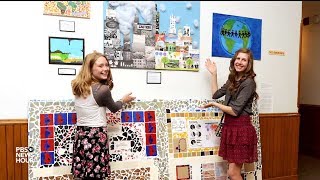(单词翻译:单击)
听力文本
JUDY WOODRUFF: Next: another installment of our weekly Brief But Spectacular series, where we ask people about their passions. Tonight, Dana Mortenson, CEO of World Savvy, which is a national education program, she is working to prepare students for a more diverse, globally connected world.
DANA MORTENSON, Co-Founder and CEO, World Savvy: The demographic changes across this country are phenomenal. In 1970, the population of the U.S. was 88 percent white. By 2010, that had dropped to 75 percent white, and it's estimated that, by 2050, that number be 47 percent. So, for the first time, we will be a collective majority. No single ethnicity or culture will be in majority in this country. And that's already true for the population under 18. Students definitely find international affairs intimidating. Most of the studies that you see over the last several decades is that Americans, particularly young Americans, don't know a lot about the rest of the world. And so a natural byproduct of that is fear of things that we don't know and that we don't understand. So, World Savvy is a national movement that's reimaging K-12 education. And the way we work is by focusing on student engagement, to take complex issues in the world and learn about them and to create knowledge to action projects that help them take action, so that you can leverage diversity in the classroom as an asset. A lot of our methodology is around saying, we don't believe young people have potential to lead in the future, but that you have that in the present. The way that international affairs was taught for so many years was sort of food flag festival. We made a buche de noel. We celebrated Cinco de Mayo. We had a Black History Month. Shifting that and allowing young people to kind of do two things, one, to explore themselves, their history and their identity in that place and space, and then also allowing them to kind of move towards the issues they're passionate about, is a really critical way to kind of get them hooked on wanting to know something outside themselves. The reality is, we are not preparing young people for a standardized world. The only sort of common thread with what young people will encounter after they graduate is change, particularly when you think about the kinds of problems that this next generation will inherit. We're looking at climate change, migration, poverty, war, grappling with how technology will advance. The other way we're sort of falling short with K-12 education is that that focus on achievement and how we have defined what it is leaves very little room to measure what matters. If you ask most parents what they want for their young people, in addition to just graduating from school, they want them to be good people, to be able to work with others. Those are things that get lost in translation because people think they can't be embedded into educational discourse or that they lack rigor, when, truly, it can be done. It can be done, and it can be measured. My name is Dana Mortenson, and this is my Brief But Spectacular take on being World Savvy.
重点解析
1.in the present 目前
That is a very substantial improvement in the present situation.
在当前形势下这是一个非常巨大的进步。
2.hook on 挂钩
Language does not hook on to the real world.
语言和真实的世界并不是完全钩联的。
3.embed into 嵌入
It can be embedded into other software, so it seems that the software has professional encipherment function.
能直接嵌入各类应用软件,仿佛使其具有加密功能一般。
4.look at 看看
I think if I went to look at more gardens, I would be better on planning and designing them.
我觉得如果我更多地去看一些花园,就有可能更好地规划和设计它们。
参考译文
朱蒂·伍德拉夫:接下来是我们每周Brief But Spectacular系列,在这里我们探寻人们的激情。今晚,做客节目的是全国教育项目World Savvy的首席执行官戴娜·莫特森,她正努力培养学生,让他们融入这个更加多元,全球互通的世界。
戴娜·莫特森,World Savvy的联合创始人兼首席执行官:这个国家经历了巨大的人口变化。1970年,美国人口中,白人占88%。到2010年,这个数字下降到了75%,估计到2050年,这个数字将为47%。所以,我们首次将成为一个多数群体。在这个国家,任何一个种族或文化都不会占据多数。这对18岁以下的人口来说,已成事实。对于国际事务,学生们肯定感到畏惧。过去的几十年里,你所看到的大多数研究都表明:美国人,尤其是美国的年轻人,对世界的其他地方知之甚少。因此,自然形成了一个副产品就是,我们害怕那些我们不知道不了解的东西。因此,World Savvy重新审视了K-12教育,这个项目范围涉及全国。我们的运作方式是学生参与,将复杂的全球问题拿出来,让他们了解,创建知识,实际动手,帮助他们有所作为,这样你就可以发挥课堂上的多样性,使之成为一种资产。我们的许多方法都证明,我们不相信年轻人能够引领未来,但这里年轻人此时此刻就在作为。多年来讲授国际事务的方式都有点像国旗食品节。我们有圣诞树桩蛋糕。我们庆祝五月五日节。我们有一个黑人历史月。转变一下,让年轻人做两件事,一是,探索自己,探索他们的历史以及他们在那个时空的身份,然后也让他们朝着他们所热衷的问题推进,这种方式非常关键,让他们迷上,了解身外之事的感觉。事实是,我们并非为年轻人准备一个标准化的世界。年轻人一旦毕业,只有一点相同就是改变,尤其是当你思考下一代还会继续面对的问题时。我们正在关注气候变化问题、移民问题、贫困问题、战争问题,以及科技进步问题。另外,某种程度上,我们并未完成K-12教育,原因在于我们太过专注于成绩,而我们对于成绩的定义,太过狭隘,以至于很难去衡量那些真正重要的东西。如果你问大多数家长,他们对自己孩子们的期许,除了顺利毕业,他们希望他们能当好人,能够与他人合作。这些都是我们理解“成绩”一词的过程中遗失的东西,因为人们认为他们不能被嵌入到教育话语中,或者他们缺乏严谨性,而真的,我们可以做到。我们可以做到,这也可以衡量。我是戴娜·莫特森,这是我的Brief But Spectacular,关于World Savvy。
译文为可可英语翻译,未经授权请勿转载!


